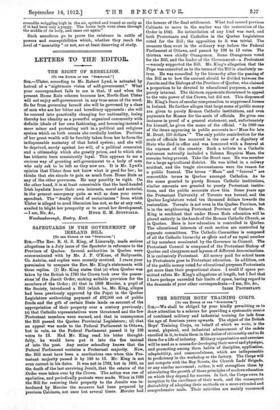SAFEGUARDS IN THE GOVERNMENT OF IRELAND BILL.
[To THZ ECM& OF TIER "SPECTATOR."' SIR,—The Rev. R. G. S. King, of Limavady, made serious allegations in a July issue of the Spectator in reference to the Province of Quebec. Several authorities in Quebec were communicated with by Mr. J. P. O'Kane, of Ballycastle, Co. Antrim, and replies were recently received. I crave your permission to compare the Rev. Mr. King's statements with these replies. (1) Mr. King states that (a) when Quebec was taken by the British in 1763 the Crown took over the posses- sions of the Jesuit Order, making suitable provision for the members of the Order ; (b) that in 1888 Mercier, a pupil of the Society, introduced a Bill (which he, Mr. King, alleges had been previously approved by the Pope) in the Quebec Legislature authorizing payment of £92,000 out of public funds and the gift of certain State lands on account of the appropriation of their property over a century previously ; (c) that Catholic representatives were threatened and the few Protestant members were warned, and that in consequence the Bill passed the Quebec Provincial Legislature ; (d) that an appeal was made to the Federal Parliament in Ottawa, but in vain, as the Federal Parliament passed it by 188 votes to 13. Had Mr. King read his letter thought- fully, he would have put it into the fire instead of into the post. Any senior schoolboy knows that the Federal Parliament contains a Protestant majority. Now, the Bill must have been a meritorious one when this Pro- testant majority passed it by 188 to 13. Mr. King is not even correct in his dates. It was not in 1763, but in 1800, on the death of the last surviving Jesuit, that the estates of the Order were taken over by the Crown. The action was one of spoliation, and periodically protests were made. When in 1888 the Bill for restoring their property to the Jesuits was in- troduced by Mercier the measure had been prepared by previous Cabinets, not once bat several times. Mercier had the honour of the final settlement. What had caused previous Cabinets to move in the matter was the restoration of the Order in 1842. No intimidation of any kind was used, and both Protestants and Catholics in the Quebec Legislature voted for the Bill ; the opposition to it was trivial. The measure then went in the ordinary way before the Federal Parliament at Ottawa, and passed by 188 to 13 votes. The thirteen were chiefly Orangemen. Some Orangemen voted for the Bill, and the leader of the Government—a Protestant —warmly supported the Bill. Mr. King's allegation that the Pope was consulted as to the terms of the Bill is absolutely un- true. He was consulted by the hierarchy after the passing of the Bill as to how the amount should be divided between the Jesuits and the Bishops of the Province of Quebec, who claimed a proportion to be devoted to educational purposes, a matter purely internaL The thirteen opponents threatened to appeal to the veto power of the Crown, but did not. This disposes of Mr. King's fears of secular compensation to suppressed houses in Ireland. He further alleges that large sums of public money are given to purely Roman Catholic institutions, and even payments for Masses for the souls of officials. He gives one instance in proof of a general statement, and, unfortunately for himself, he gives the name of the official. "In 1909 one of the items appearing in public accounts is—' Mass for late M. Broet, 150 dollars.'" The only public contribution for the souls of officials has occurred in the case of a dignitary of State who died in office and was honoured with a funeral at the expense of the country. Such a tribute to a Catholic statesman naturally included a Solemn Requiem Mass, the remains being present. Take the Broet case. He was member for a large agricultural district. He was killed in a railway accident, and the tragic circumstances were the reason for a public funeral. The terms "Mass" and " funeral " are convertible terms in Quebec amongst Catholics. As to the sums granted to purely Roman Catholic institutions, similar amounts are granted to purely Protestant institu- tions, and the public accounts show this. Some years ago the Protestant University of Toronto was burned, and the Quebec Legislature voted ten thousand dollars towards the restoration. Toronto is not even in the Quebec Province, but is in the neighbouring Protestant Province of Ontario. Mr. King is confident that under Home Rule education will be placed entirely in the hands of the Roman Catholic Church, as in Quebec. Here is how education is controlled in Quebec. The educational interests of each section are controlled by separate committees. The Catholic Committee is composed of all the Catholic hierarchy ex officio and of an equal number of lay members nominated by the Governor in Council. The Protestant Council is composed of the Protestant Bishop of Quebec and clergymen and laymen of different denominations. It is exclusively Protestant. All money paid for school taxes by Protestants goes to Protestant education. In addition, out of the public money voted for educational purposes Protestants get more than their proportional share. I could if space per- mitted refute Mr. King's allegations at length, but I feel that I have perhaps exceeded fair limits of space, having regard to the demands of your other correspondents.-1 am, Sir, &c.,
IRISH PROTESTANT.






































 Previous page
Previous page